Budget deficit to remain high in next fiscal year also
Taming inflation, higher expenditure contradictory, say economists

Published :
Updated :

Budget deficit in the next fiscal year is likely to be Tk 2.50 trillion as the government frames a slightly expansionary budget amid ongoing elevated inflationary pressure, officials said, although inflation control remains its high priority.
The government is likely to frame a Tk 7.969-trillion national budget for the fiscal 2024-25 with one-third of the outlay constituting a gap between income and expenditure targets.
Economists find such massive deficit amid the ongoing economic slowdown contradictory to government priority of inflation control in the upcoming fiscal year.
Bangladesh passes through a higher trajectory of inflation for over a year, which is still close to double-digit figure on a point-to-point basis.
In the last month of April, the inflation rate was recorded at 9.74 per cent in the Bangladesh Bureau of Statistics (BBS) data.
Ministry of Finance (MoF) officials say since the country's better economic growth will have to be kept continuing, they opted for a higher-expenditure target than the one in the current FY2024.
"We know that we need borrowing to bankroll the deficit budget, but we have planned to keep the economy growing," a senior official told the FE correspondent.
"At the same time, we are going to lay top priority on controlling inflation in the next national budget," he added.
According to the MoF officials, the government is likely to set a target of pegging inflation within 6.5 per cent in FY2025.
They hope to keep the budget deficit within 5.0 per cent of the targeted GDP or gross domestic product.
Meanwhile, the government kept the budget deficit at Tk 2.61 trillion, or 5.2 per cent of the GDP, in the outgoing budget worth Tk 7.62 trillion.
Noted economist Dr Debapriya Bhattacharya told the FE that the contractionary monetary policy and higher budget deficit do not fit in this moment properly.
"When you will prepare a budget with higher deficit, then you will definitely go for borrowing. You may go to local banks or to the foreign lenders to bankroll the deficit budget. If you go for local borrowing, there will be a crowding-out effect," he says about the budget arithmetic.
And then the credit flow to the investors will be lower and investment will be slower further.
"On the other hand, when you will spend more, there will be an impact on the inflation in the economy," he adds.
Chief Executive of Policy Exchange Bangladesh Dr Masrur Reaz thinks contractionary monitory policy but expansionary fiscal expenditure is contradictory strategy.
"If the government wants to tame the inflation, the budget size should be smaller than the previous ones and the deficits, too," he says.
"When it will go to borrow from banks to finance the budget deficit, there will be crowding-out effect and the investment will slow down further."
kabirhumayan10@gmail.com


 For all latest news, follow The Financial Express Google News channel.
For all latest news, follow The Financial Express Google News channel.